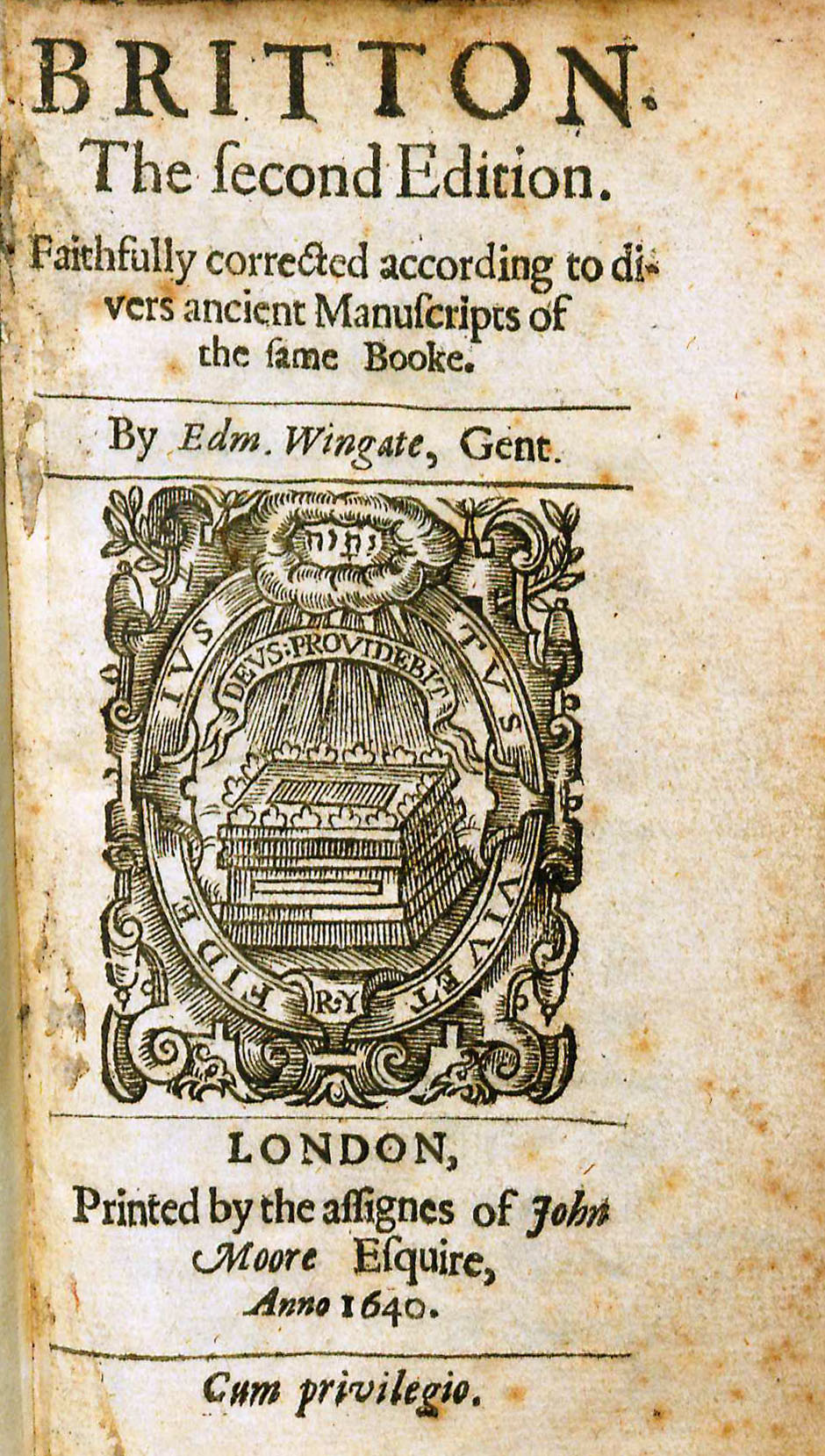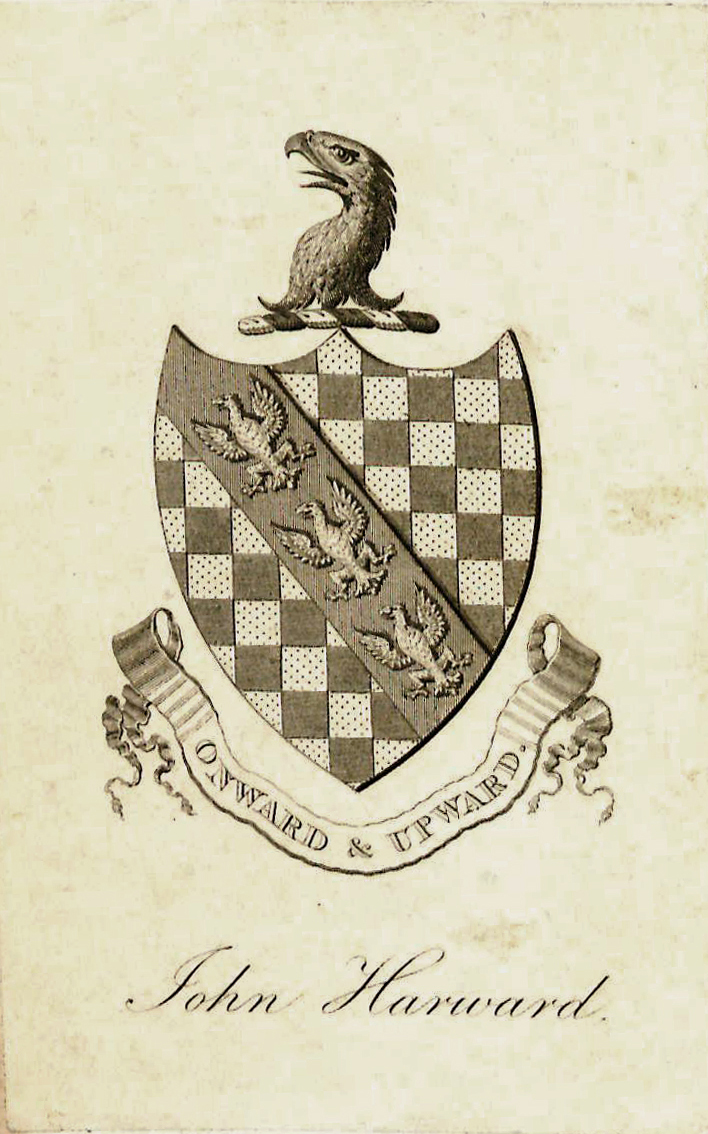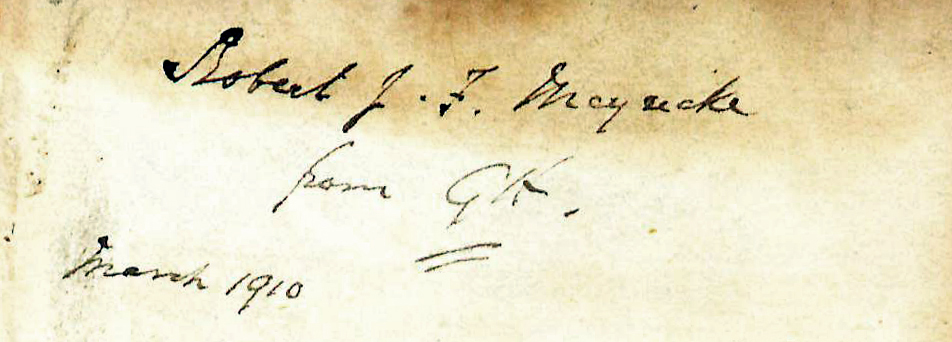Difference between revisions of "Britton"
| Line 33: | Line 33: | ||
Small octavo bound in full antique calf with original backstrip laid on. Spine features raised bands and a gilt-lettered morocco label. Includes the armorial bookplate of John Harward on the front pastedown and previous owner's inscription "Robert J. F. Meyricke, from GH., March 1910" on the front fly leaf. Purchased from Roger Middleton Fine and Rare Books.<br /> | Small octavo bound in full antique calf with original backstrip laid on. Spine features raised bands and a gilt-lettered morocco label. Includes the armorial bookplate of John Harward on the front pastedown and previous owner's inscription "Robert J. F. Meyricke, from GH., March 1910" on the front fly leaf. Purchased from Roger Middleton Fine and Rare Books.<br /> | ||
<br /> | <br /> | ||
| − | View this book in [https://catalog.swem.wm.edu/law/Record/3446407 William & Mary's online catalog.] | + | View the record for this book in [https://catalog.swem.wm.edu/law/Record/3446407 William & Mary's online catalog.] |
==External Links== | ==External Links== | ||
Revision as of 13:56, 16 March 2015
by John le Breton
| Britton | |
|
Title page from Britton, George Wythe Collection, Wolf Law Library, College of William & Mary. | |
| Author | John le Breton |
| Published | London: Printed by the assignes of John Moore Esquire |
| Date | 1640 |
| Edition | Second edition faithfully corrected according to divers ancient manuscripts of the same booke by Edm. Wingate, Gent. |
| Language | Law French |
| Pages | [16], 287 [i.e. 291], [21] leaves |
| Desc. | 8vo. (15 cm.) |
Attributed to John le Breton (sometimes John de Breton, John Bretun, Brito, or Britton; d. 1275), but largely based on the practical parts on De Legibus et Consuetudinibus Angliae (1250-1260) by Henry de Bracton with the addition of such statutes and legal changes as were necessary to bring Bracton's law up to date.[1] The origins of Britton may be traced to a project of Edward I to produce a digest of the English law in the spirit of Justinian's Institutes. Britton's book, first published in 1540, is the earliest English law book in the French language.[2]
John le Breton, justice and bishop of Hereford, was chosen bishop from among the canons of Hereford in January 1269 and was consecrated on 2 June of that year. On his death in 1275 certain chronicles describe him as an ‘expert in English laws, who had written a book about them called le Bretoun’. The bishop could not in fact have written Britton in the version in which it has survived, because this third full-scale treatise on English law to survive (along with Bracton and Fleta) from the thirteenth century refers to statutes made up to fifteen years after his death, and the question is why he should have been credited with its authorship. John Selden argued in the seventeenth century that the bishop had been confused with the contemporary judge Henry of Bracton, the supposed author of the great treatise De Legibus et Consuetudinibus Angliae, of which the untitled Britton might be regarded as a condensation. Selden observed that the words attributing the book to John le Breton do not appear in most of the annals recording the bishop's death, and believed that they were a much later interpolation ‘by some smatterer’ in those few manuscripts of the Flores historiarum in which they do appear.[3]
Evidence for Inclusion in Wythe's Library
Ordered by Wythe from John Norton & Sons in a letter dated May 29, 1772. Records indicate the order was fulfilled.[4] Three of the Wythe Collection sources (Dean's Memo[5], Brown's Bibliography[6] and George Wythe's Library[7] on LibraryThing) list the 1640 edition as the probable one owned by Wythe. The fourth lists the date as "164?."[8] Thomas Jefferson owned this edition and sold it to the Library of Congress in 1815.[9] The Wolf Law Library purchased a copy of the 1640 edition.
Description of the Wolf Law Library's copy
Small octavo bound in full antique calf with original backstrip laid on. Spine features raised bands and a gilt-lettered morocco label. Includes the armorial bookplate of John Harward on the front pastedown and previous owner's inscription "Robert J. F. Meyricke, from GH., March 1910" on the front fly leaf. Purchased from Roger Middleton Fine and Rare Books.
View the record for this book in William & Mary's online catalog.
External Links
References
- ↑ William Holdsworth, A History of English Law, 4th ed. (London: Methuen & Co., Sweet and Maxwell, 1936), 2:320.
- ↑ Heinrich Brunner, The Sources of the Law of England: An History Introduction to the Study of English Law, trans. W. Hastie (Edinburgh: T. & T. Clark, 1888), 29.
- ↑ Alan Harding, "Breton, John le (d. 1275)" in Oxford Dictionary of National Biography, accessed June 6, 2013.
- ↑ Frances Norton Mason, ed., John Norton & Sons, Merchants of London and Virginia: Being the Papers from their Counting House for the Years 1750 to 1795 (Richmond, Virginia: Dietz Press, 1937), 242-243. The letter is endorsed "Virga. 29 May 1772 / George Wythe / Recd. 21 September / Goods Entr. pa. 163/ Ans. the March 1773."
- ↑ Memorandum from Barbara C. Dean, Colonial Williamsburg Found., to Mrs. Stiverson, Colonial Williamsburg Found. (June 16, 1975), 7 (on file at Wolf Law Library, College of William & Mary).
- ↑ Bennie Brown, "The Library of George Wythe of Williamsburg and Richmond," (unpublished manuscript, May, 2012) Microsoft Word file. Earlier edition available at: https://digitalarchive.wm.edu/handle/10288/13433.
- ↑ LibraryThing, s.v. "Member: George Wythe," accessed on June 28, 2013.
- ↑ Mary R. M. Goodwin, The George Wythe House: Its Furniture and Furnishings (Williamsburg, Virginia: Colonial Williamsburg Foundation Library, 1958), XLVI.
- ↑ E. Millicent Sowerby, Catalogue of the Library of Thomas Jefferson, 2nd ed. (Charlottesville: University Press of Virginia, 1983), 2:214 [no.1773].


